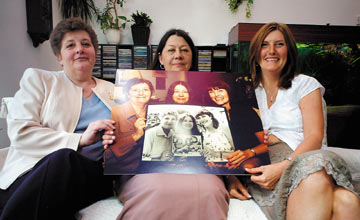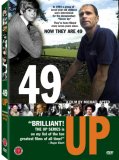| Reviews & Columns |
|
Reviews DVD TV on DVD Blu-ray 4K UHD International DVDs In Theaters Reviews by Studio Video Games Features Collector Series DVDs Easter Egg Database Interviews DVD Talk Radio Feature Articles Columns Anime Talk DVD Savant Horror DVDs The M.O.D. Squad Art House HD Talk Silent DVD
|
DVD Talk Forum |
|
|
| Resources |
|
DVD Price Search Customer Service #'s RCE Info Links |
|
Columns
|
|
|
49 Up
- Jesuit maxim heard in every Up film
For many years in this reviewer's family, various aunts, uncles, cousins and grandparents would get together for one day over the Christmas holiday. These family reunions were really the only time I'd see most of these relatives, and the event was rotated from one home to another so that we'd come back to the same place only every third year or so. I hardly knew most of these people except for this annual ritual, and it was a strange, fascinating experience to see little kids grow up into adulthood and gradually have little kids of their own while older relatives got fatter and grayer, and their homes and hairstyles and fashions changed with the times. The experience wasn't so much about them as much as it was a reminder to me: I was getting older, too, and that life and aging were going on even if you didn't notice it.

That's the essence of 49 Up (2005), the superb seventh documentary (so far) that's part of a series of British television films ultimately functioning as a single, epic examination of human existence. The first film, Seven Up! (1964), was originally conceived as a left-leaning condemnation of the British class system and consisted of interviews with 14 seven-year-olds from disparate backgrounds, notably contrasting privileged children from very wealthy families attending exclusive preparatory schools with East Enders fending for themselves in an inadequate public school system. Director Michael Apted, who had been a researcher on the first documentary, went back and filmed the same children seven years later for 7 Plus Seven (1970), 21 (1977), 28 Up (1985), 35 Up (1991), and 42 Up (1998). Over time, the class issue faded into the background, partly because as they got older many of the East Enders through hard work moved into the ranks of the middle class, but mainly because Apted discovered that it was the people themselves rather than the politics of their situations that mattered most and were so compelling. Moreover, while in some ways most were clearly shaped to some degree by the benefits of wealth or the disadvantages of poverty, each subject is almost more recognizably universal by their personality - personalities that were already apparent and eerily locked into place at age seven.
Though comparisons of The Up Series** to present-day reality television is, regrettably, inevitable for most reviewers, the power of this work - and it's a power quite unlike any other in all of television/cinema - is lost on those who haven't seen it. Its subjects, 12 of whom have more or less stayed with the series up to now (though one has announced 49 Up will mark her last appearance) are mostly very uncomfortable exposing their lives so publicly. Laying bare one's awkward puberty at 14 or unattractive aging at 49 for all the world to see, to say nothing of exposing one's unhappy marriages, feelings of inadequacy, etc., decade-after-decade is a heavy cross to bear. But while many audiences initially come into the series to gawk at the participants' physical transformations and often very dramatic life changes, it soon becomes apparent that Up's audience is in fact genuinely rooting for everyone, rich and poor, the way one would for a member of the family and, more importantly, ultimately, the series isn't so much about their lives as it is about the act of living.
One of the many compelling elements of 49 Up and its predecessors is that, in one sense, when director Apted asks those off-camera questions he is in a sense asking everyone in his audience. We don't necessarily identify with one subject or another but we certainly recognize shared experiences and common emotions scattered among many of the interviewees. As someone just one Up movie away from 49 Up, it's impossible not to wonder which directions life will be heading, assuming this reviewer can make it that far.
(Mild Spoilers)
Like the varying film stock (and now digital video) used to film them, each Up movie has its own distinct personality and this is no exception. Its participants make fewer dramatic shifts in their lives this time out, as opposed to earlier films like 28 Up, when Suzy had dramatically transformed from an apparently unhappy, chain-smoking 21-year-old to a contented wife and mother by 28, or Neil, whose seemingly happy early childhood took a stark and deeply troubling turn downward from around puberty through to his mid-thirties. Perhaps the most satisfying Up movie thus far, longtime viewers will be enormously satisfied - and relieved - to find that nearly everyone involved has reached a certain contentment with their lives at 49. If there's a single word that can distinguish and best describe this Up it's this: acceptance.
Now grandparents themselves they've witnessed or are witnessing their own children having children, are coming to terms with their parents' mortality, as well as their own (with health problems introduced in 42 Up), dreams that have never come to pass while new ones take their place. All of this is utterly captivating.
Video & Audio
The Up films enter the digital age with 49 Up. Previously shot on 16mm and 35mm, the new film was produced on digital video (presumably high-def PAL) and presented here 16:9 enhanced. The PAL conversion is obvious on big screen TVs, but the image looks great otherwise. As with First Run Features' DVD of The Up Series it's not subtitled, which would have helped many non-Brits through some of the thicker accents. (It is closed-captioned, however.)
Extra Features
Supplements include an extremely intelligent interview with director Apted by film critic Roger Ebert, a longtime champion of the films who really understands what makes them so special. And it's hard not to notice that Ebert's near-constant presence on TV since the mid-1970s has functioned in a not-dissimilar way. We've spent 30 years discovering the same movies Roger has at the same time he does, and have watched him and his onetime partner Gene Siskel grow older, get sick, and in Siskel's case suddenly pass away. The 30-minute interview has awful sound, like it was recorded in a hydraulic plant, but at least you can her both men clearly. A short biography of the director and a photo gallery are also included.
Parting Thoughts
49 Up achieves something else quite transcendental: its reluctant subjects, picked more or less at random, have through this documented evolution of their lives revealed the extraordinary in the ordinary and in turn, through their universality, the extraordinariness in us all.
**You can read Bill Gibron's review of The Up Series prior to 49 Up here
Film historian Stuart Galbraith IV's most recent essays appear in Criterion's new three-disc Seven Samurai DVD and BCI Eclipse's The Quiet Duel.
|
| Popular Reviews |
| Sponsored Links |
|
|
| Sponsored Links |
|
|
| Release List | Reviews | Shop | Newsletter | Forum | DVD Giveaways | Blu-Ray | Advertise |
|
Copyright 2024 DVDTalk.com All Rights Reserved. Legal Info, Privacy Policy, Terms of Use,
Manage Preferences,
Your Privacy Choices | |||||||













